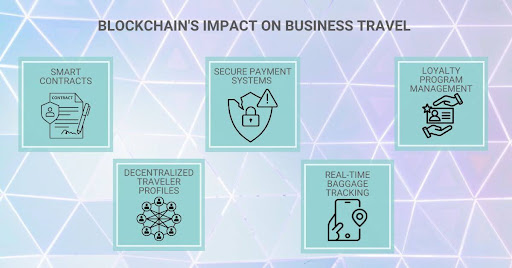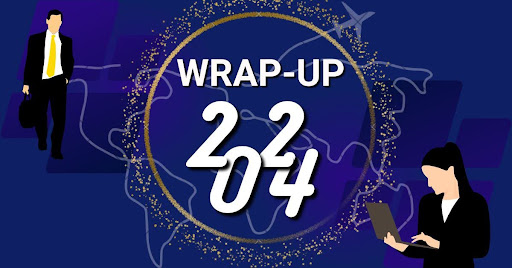
Blockchain technology is poised to transform the business travel industry, bringing unprecedented transparency, security, and efficiency. Known for its decentralized, tamper-proof ledger system, blockchain offers solutions to longstanding travel issues, including complex payment processes, lack of transparency, and data vulnerabilities.
With the global business travel market valued at over $1.4 trillion, blockchain’s impact already shows potential. According to Grand View Research, the blockchain market is projected to grow from $17.46 billion with a CAGR of 87.7% from 2023 to 2030.
Blockchain could eliminate intermediaries and improve expense management by enabling secure, direct payments and smart contracts that automatically execute bookings and refunds. From loyalty program optimization to fraud prevention, blockchain is set to bring a new era of efficiency and trust to corporate travel, changing how companies manage and secure travel transactions on a global scale.
The business travel industry expects blockchain to offer greater efficiency in transaction processing by eliminating intermediaries, reducing transaction fees, and speeding up payment and reimbursement cycles.
Blockchain’s ability to provide a transparent and immutable record of transactions can help improve policy compliance, track expenses, and ensure accurate reporting, making it easier for companies to manage travel budgets. As businesses prioritize data security, blockchain is also expected to provide a higher level of protection against fraud and unauthorized access, strengthening the overall security of corporate travel operations.
Understanding Blockchain Technology
Blockchain technology is a decentralized, secure, and transparent way of recording digital transactions and data. It functions as a digital ledger, storing information chronologically in ‘blocks’ linked or ‘chained’. This system ensures that once data is recorded in a block, it is nearly impossible to alter, as each block contains a cryptographic hash of the previous one.
This design makes blockchain tamper-resistant, as changing any block would require modifying all subsequent blocks across the network—a nearly impossible task due to its decentralized structure.
A key feature of blockchain is its peer-to-peer network, meaning data isn’t stored in a single, central location. Instead, it’s distributed across multiple nodes (computers), independently validating each transaction, making the system transparent and secure against fraud.
Blockchain is also praised for smart contracts and automated agreements executed once conditions are met. Smart contracts remove the need for intermediaries, reduce costs, and ensure timely and transparent transactions.
According to a Deloitte survey, 81% of global executives believe blockchain is highly scalable and has reached mainstream adoption—a sentiment that continues to drive investment and development. In finance, blockchain is projected to save banks up to $27 billion annually by 2030 through enhanced efficiency and reduced fraud.
Industries like healthcare and supply chain management also leverage blockchain to secure sensitive data and streamline operations. For example, IBM’s Food Trust blockchain program allows companies like Walmart and Nestlé to track the source and journey of food products, thereby reducing the risk of contamination and improving consumer safety.
Navigating Blockchain’s Impact on Business Travel
Blockchain technology holds significant potential to enhance transparency, security, and efficiency in corporate travel transactions. Key applications include smart contracts, secure payment systems, and improved loyalty program management.
Here’s an analysis of each area:
1. Smart Contracts: Automating Travel Transactions
Smart contracts—self-executing contracts with the agreement’s terms directly embedded in code—are one of the most promising blockchain applications for corporate travel. These digital contracts automatically enforce and execute terms when certain predefined conditions are met, removing the need for intermediaries, which can reduce costs and increase efficiency.
A simple analogy for a smart contract is a vending machine: when you insert the correct amount of money, the machine automatically dispenses the selected item without requiring a cashier. Similarly, smart contracts streamline various business travel processes. For instance, when a traveler books a flight or hotel room, the smart contract automatically executes the payment and confirms the reservation.
This automation eliminates the need for intermediaries (such as travel agents), reducing transaction times and costs. Business professionals can secure bookings quickly, enabling them to focus on their core responsibilities rather than spending time managing reservations.
Booking and Payment Automation
- How It Works: When a business traveler books a flight or hotel using a smart contract, payment processing, and reservation confirmation happen simultaneously and instantly. The smart contract’s code triggers these actions when the booking request is made, ensuring a seamless and transparent transaction.
- Advantages: This automation eliminates manual processing, reducing delays and errors. If a flight is canceled or delayed, a smart contract can automatically initiate a refund or rebook the traveler on a different flight based on preset terms without the need for additional intervention.
- Example: Imagine a corporate travel manager who has arranged for employees to book flights via a smart contract-based platform. If a traveler’s flight is delayed, the smart contract could automatically rebook them on the next available flight or provide compensation without contacting customer service.
Expense Reconciliation
- How It Works: Reconciliation of travel expenses is often time-consuming and prone to error, as it involves validating receipts, cross-checking with policy limits, and processing reimbursements. With smart contracts, expense verification and reconciliation can happen automatically. Once a transaction meets the pre-set rules (such as spending limits, approval criteria, or eligible expenses), it is automatically approved and logged for reimbursement.
- Advantages: This streamlines administrative tasks, reducing manual workloads for finance teams and minimizing human error. Additionally, travelers experience faster reimbursements, improving satisfaction.
- Example: If a traveler submits a meal expense during a business trip, a smart contract could verify that the amount meets company policy guidelines and automatically approve it. This cuts down on processing times and ensures policy adherence without repetitive manual checks.
Hotel Check-Ins and Car Rentals
- How It Works: Smart contracts can facilitate direct hotel check-ins and car rentals by verifying a traveler’s identity on a blockchain network. When a traveler arrives at a hotel or car rental location, the smart contract confirms their booking and identity, granting access to their room or vehicle without needing physical keys or cards.
- Advantages: This digital check-in process enhances convenience and security, as travelers don’t need to wait in lines or carry physical items. It’s particularly helpful for frequent business travelers who prioritize efficiency and speed.
- Example: A corporate traveler arrives at their hotel, and instead of waiting at the front desk, their smart contract-activated reservation allows them to head directly to their room. The contract unlocks the door using their phone as verification, creating a seamless, hands-free experience.
2. Secure Payment Systems For Enhancing Data Security
The business travel industry is vulnerable to fraud. According to data from the Federal Trade Commission (FTC), Americans lost $8.8 billion to fraud in 2022. Blockchain’s decentralized structure and encryption capabilities provide a more secure alternative to traditional payment systems.
- Secure Data Storage: Blockchain stores transaction data in encrypted blocks linked together, making it nearly impossible for unauthorized users to alter or hack the information.
- Immutable Transactions: With blockchain, every transaction is recorded and cannot be altered without consensus, reducing opportunities for fraud.
- Tokenized Payments: Companies can securely manage travel expenses using blockchain-based tokens or digital currencies. Digital wallets tied to blockchain can further ensure that only authorized users can access funds, providing an additional layer of security for corporate travel payments.
IBM has developed a blockchain payment solution for travel expenses, which enables travel managers to track and secure all transactions in real-time. By having a transparent record of every transaction, companies gain visibility over costs, which helps prevent unauthorized spending and fraud.

3. Loyalty Program Management
Loyalty programs are widely used to retain customers and reward frequent travelers. Still, business travelers often need help with loyalty points that are difficult to track, redeem, or use across multiple vendors. Blockchain can revamp loyalty programs by offering:
- Interoperable Points: Blockchain enables loyalty points to be exchanged across different programs (airlines, hotels, car rentals), allowing travelers to maximize their rewards.
- Real-Time Tracking: With blockchain, companies can give travelers real-time access to their loyalty points, simplifying the redemption process.
- Enhanced Security: By securing loyalty points on the blockchain, companies can prevent unauthorized access and fraudulent activity, which can otherwise erode customer trust.
Singapore Airlines introduced KrisPay, a blockchain-based loyalty wallet that enables frequent flyers to convert their miles into KrisPay credits, which can be used at partner merchants. This innovative approach demonstrates blockchain’s potential to streamline loyalty programs, making it easier for travelers to utilize points and for companies to build stronger customer relationships.
4. Decentralized Traveler Profiles
Blockchain can securely store decentralized traveler profiles, where travelers’ information—such as ID verification, travel preferences, and booking history—resides in an encrypted, tamper-proof format. These profiles are accessible to verified entities across the travel network, allowing travelers to maintain control over their data and only share it with service providers when necessary.
This decentralized approach to managing traveler data enhances privacy and security, as personal information is not stored on a centralized server vulnerable to breaches. It also allows travelers to avoid repeatedly entering information across different platforms, streamlining the booking and check-in process.
5. Real-Time Baggage Tracking
Using blockchain for baggage tracking can create a unified, transparent system where luggage information is continuously updated across multiple checkpoints—airports, airlines, and transport services—enabling real-time monitoring.
Blockchain’s shared ledger technology allows different parties to track baggage in real time without relying on a central system, so travelers can see their baggage status on a secure, transparent platform. Blockchain-enabled tracking reduces the risk of lost or mishandled baggage by providing a complete, immutable log of each bag’s journey.
It also allows travelers to monitor their baggage status in real-time, providing peace of mind and reducing support inquiries.
Innovative Blockchain Applications Transforming the Business Travel Industry
1. Identity and Passport Verification
Blockchain can streamline the identity verification process for business travelers. By storing traveler data securely on the blockchain, companies can ensure quicker and more secure identity verification at check-ins, security, and customs. This reduces the need for manual document checks and provides a more seamless experience at airports, hotels, and other travel-related services.
2. Supplier Payments and Smart Invoicing
Blockchain’s ability to create tamper-proof and transparent records can improve the way payments are made between businesses and suppliers. Smart contracts can automate payments to travel suppliers like hotels, airlines, and car rental companies, ensuring that payments are made when certain conditions are met (e.g., after a service has been provided). This reduces delays, eliminates disputes, and provides a clearer audit trail for financial transactions.
3. Automated Insurance Claims
Blockchain can automate the claims process for business travel insurance. With smart contracts, if a pre-set condition (such as a flight delay or lost luggage) occurs, a claim can be triggered automatically without the need for manual intervention. This speeds up the reimbursement process, improves customer satisfaction, and reduces the administrative burden for insurance providers.
5. Tokenized Payments for Travel Services
Instead of relying on traditional currency or credit cards, blockchain can enable the use of digital tokens or cryptocurrency to pay for travel services. For instance, a company could issue its own travel-specific token that employees can use to pay for flights, hotel stays, and other business travel expenses. This offers a seamless, cross-border payment solution with lower fees and faster processing times.
Future Potential of Blockchain in Business Travel
- Wider Adoption of Secure Digital Identity: Blockchain-based digital identity solutions can transform how personal identification is handled in travel. By providing a secure, unified identity record, blockchain allows for seamless verification across airlines, hotels, and security checkpoints.
- International Air Transport Association (IATA) has launched initiatives to explore digital travel credentials (DTCs) that could facilitate a smoother and more secure journey experience.
- Greater Efficiency in Travel Supply Chains: Blockchain technology can enhance the operational efficiency of travel providers by providing a transparent and tamper-proof record of supply chain activities.
- For example, when sourcing products for onboard services, blockchain can track each step from vendor to final delivery, ensuring compliance and authenticity and reducing fraud risks.
- Improved Interoperability Among Platforms: As blockchain adoption grows, it could enable enhanced interoperability among various travel platforms. For instance, a shared blockchain ledger among airlines, hotels, and car rental companies could enable seamless data sharing and streamlined processes across platforms, benefiting both travelers and service providers by reducing redundancies and increasing data accuracy.
- Enhanced Fraud Prevention: The travel industry is vulnerable to fraud, with losses reaching significant sums each year. Blockchain’s transparent and immutable nature offers a powerful deterrent against fraudulent activities, as each transaction can be easily traced back to its origin, creating accountability. For instance, blockchain can help mitigate friendly fraud (when a customer disputes a legitimate charge), particularly in sectors like travel and hospitality.
- Expanded Use of Tokenization for Seamless Transactions: In the future, blockchain could enable tokenized transactions, where travelers can use tokens to pay for services across different providers, even internationally. This system could streamline exchange processes, especially for corporate travelers, by reducing reliance on currency exchanges and offering faster, more efficient payments.
Top 3 Challenges Hindering Blockchain Implementation
- Scalability Issues: Although blockchain offers promising benefits, scalability remains a concern. Current blockchain systems, especially public ones, may need help processing the high transaction volumes required by a global industry like travel. Efforts to develop more scalable solutions, such as Layer-2 scaling and permissioned blockchains, are underway.
- Imagine a travel management company using blockchain to process bookings and payments across multiple suppliers and airlines. As more transactions occur, the blockchain network might become overloaded, leading to processing lag times, which could frustrate travelers needing quick, real-time confirmations.
- Regulatory Compliance and Standardization: Blockchain operates across borders, complicating compliance with the diverse regulatory standards in the travel industry. Coordinated efforts among regulators, companies, and industry bodies like IATA are essential to standardizing blockchain use in travel. Developing frameworks for data protection, anti-money laundering, and consumer rights compliance are critical to widespread blockchain adoption.
- A blockchain-based travel booking platform may store immutable records of traveler information. If a traveler requests their data to be erased for privacy reasons, the permanent nature of blockchain could make it difficult to comply with such requests under GDPR.
- Cost and Technological Hurdles: Implementing blockchain-based solutions requires significant upfront investment, and the industry needs a universally recognized blockchain infrastructure. Businesses must weigh the costs and technical challenges against the potential long-term benefits, which may be challenging for smaller players in the travel space.
- Suppose a travel agency uses blockchain to process hotel payments for corporate clients. During peak times, network transaction fees might spike, passing unexpected costs onto the agency or clients.
The Path Forward for Blockchain in Business Travel
Blockchain can address many of the longstanding issues in the corporate travel industry. With applications in smart contracts, secure payments, and loyalty programs, it provides an innovative solution to some of the most pressing challenges in business travel.
Companies that adopt blockchain technology can expect to benefit from improved transparency, reduced fraud, and streamlined processes—ultimately leading to better cost management and an enhanced travel experience for employees.
As blockchain evolves and matures, travel management companies investing in this technology will be well-positioned to lead the industry’s transformation. For companies considering the shift, working with partners who understand blockchain technology and corporate travel’s unique demands will be key.














 and then
and then